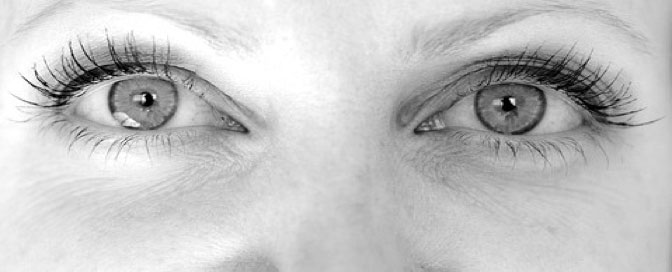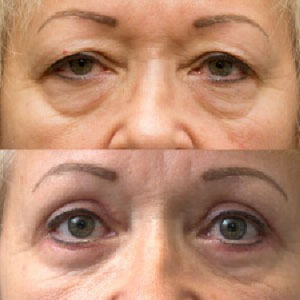
Posted by: Dr. Matheson Harris
Eyelid surgery pitfalls
Eyelid surgery, most often blepharoplasty or eyelid lifting, is one of the most common plastic surgeries done in America. Most people have eyelid surgery due to excess skin hanging down over their eyes, which may block their vision. Other times eyelid surgery is done to improve the appearance of the eyes.

Upper eyelid blepharoplasty
However, there are times when eyelid surgery is a bad idea, or must be done differently to achieve the best result. Here are the most common reasons why eyelid surgery can go bad and what to do to avoid it.
Eyelid surgery pitfall #1: Droopy eyebrows
Some patients assume they need eyelid surgery when the eyelids appear heavy or full, but often the eyebrows are the bigger problem. As the forehead and brows descend, they push the eyelid skin down on the eyes. If a surgeon were to try and remove eyelid skin and fat without addressing the brows, they would end up shortening the eyebrow to eyelash distance, pulling down the brows further, and creating unusual facial dimensions. This can make the eyes appear worse and accentuate the problem. Avoid this by comparing photos of you in your teens when the brows would have been in a normal position for you. If the brows look much lower, you need to discuss brow lifting along with any eyelid procedure with your doctor.
Eyelid surgery pitfall #2: Poor skin type
We all have different skin types, and some are better suited to healing after surgery than others. There are different scales based on both your skin color and how oily or dry you are. The one skin type I see the most problems with shows up in patients with thick, oily skin with large pores. Most commonly, this is seen in people who are overweight or obese. Unfortunately, being overweight is often associated with breathing issues including sleep apnea. These problems all conspire to make the skin heal very slowly. Swelling often lasts much longer. In these patients, it is best to not do several procedures together, but rather space them out to not cause excessive swelling. Sleep apnea should be treated with CPAP or other appropriate therapy.
Eyelid surgery pitfall #3: Overly aggressive surgery
Sometimes surgeons get carried away with surgery, or don’t properly judge what a person’s tissues can handle. This can lead to excessive removal of skin or fat, leading to problems with eyes closing or give the patient a hollow appearance. Be aware of this possibility when you look at before and after photos and talk with the doctor about the specifics of what he/she is planning to do. Don’t ask them to do “as much as possible”. They should be doing “just the right amount”, regardless.
Eyelid surgery pitfall #4: Unrealistic expectations
Any plastic surgeon’s most difficult job is managing patient expectations. Patients often bring in photos of celebrities, asking to have their eyes look a certain way. Other times, they demand that surgery be as aggressive as possible to “just get rid of all those wrinkles”. In both cases, patients don’t understand the art of knowing how much to do and when/if to do it. I talk a lot more patients out of surgery these days then I ever thought I would when I first started. A few things to consider. First, no one else has your anatomy and you can’t have someone else’s. You are going to look how you will look after surgery. Don’t ask or expect to look like anyone else, even your sister. Second, as a facial plastic surgeon, I want all my patients to look their best after surgery. I wouldn’t intentionally do less just for kicks. If your surgeon recommends a conservative skin excision with your lower eyelid surgery, it is because he/she is worried about causing complications, not because they want to operate on you again in a year or two. A surgeon who is willing to do anything you ask for isn’t thinking critically about your needs.
Educating yourself about the potential pitfalls of eyelid surgery can spare you unnecessary grief later. If you have any questions about eyelid surgery, you can email Dr. Harris at [email protected]
